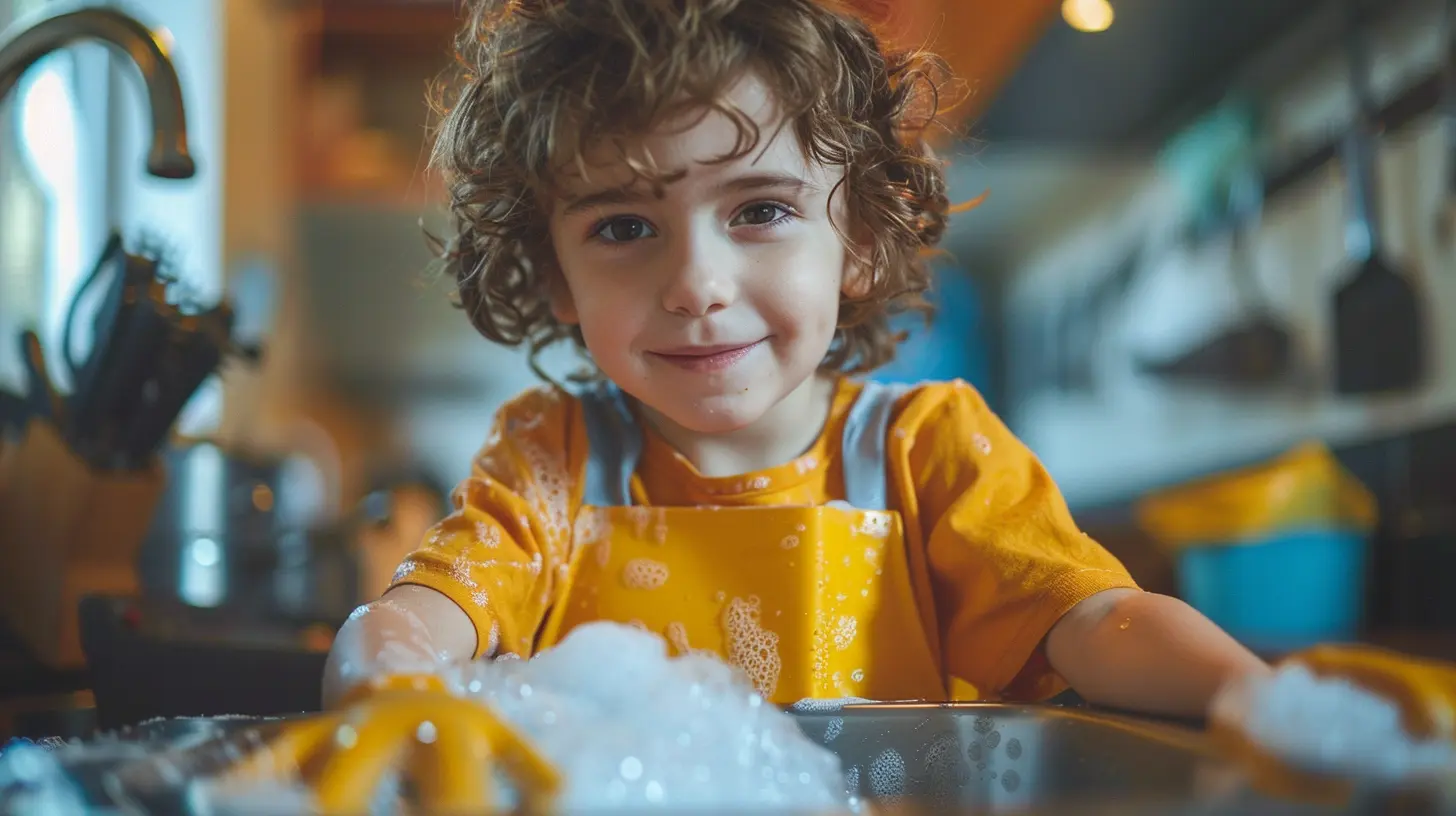How Parent Involvement in Chores Shapes a Child’s Work Ethic
3 September 2025
Let’s be real—getting your kid to do chores can feel like pulling teeth with a licorice rope. It’s messy, slow, and sometimes downright painful. But here's the kicker: involving your child in household chores is one of the most powerful (and underrated) ways to raise a responsible, hard-working, independent human being.
In today's fast-paced, screen-obsessed world, it’s easy for chores to fall by the wayside. It’s quicker to just load the dishwasher yourself, right? But every time you hand your child a rag or ask them to fold laundry, you’re not just ticking off a to-do list—you’re shaping their character in ways that echo well into adulthood.
So grab your coffee, kick back, and let’s chat about how involving your child in chores today can shape their work ethic for life.
What Exactly Is Work Ethic?
Before we dive into the how, let’s unpack the what.Work ethic is more than just being a hard worker. It’s about showing up, even when it’s tough. It’s having pride in your work, being reliable, pushing through failure, and doing the right thing—even when no one’s watching.
Now, think about that for a second. Aren’t those traits we all want for our kids?
Spoiler alert: work ethic isn’t something kids develop overnight. It’s learned, modeled, and cultivated—primarily at home.
Why Chores Are the Best Teaching Tool You’re Not Using Enough
You might be thinking, “Seriously? Folding socks is going to teach my kid life lessons?”You bet it is.
Here’s why chores are pure gold:
- They teach responsibility. Kids learn that actions have consequences—and someone’s gotta do the dirty work.
- They build confidence. Nothing says “I did it!” like a six-year-old who just made their own bed.
- They reinforce the value of effort. When kids see the fruits of their labor, they start to connect effort with results.
- They foster independence. Chores become little stepping stones toward self-sufficiency.
Bottom line: chores aren’t just about clean floors or tidy rooms. They’re little life lessons in disguise.
The Role of Parental Involvement
Here’s the thing—telling your child to “go clean their room” while you binge Netflix on the couch isn’t quite the same as being involved.Parental involvement means:
- Teaching by doing
- Encouraging rather than nagging
- Praising effort, not perfection
- Making chores a team activity (especially for younger kids)
When parents actively participate in or supervise chores, they send a loud, clear message: “This is important, and you’re capable.” That message sticks.
Monkey See, Monkey Do
Little eyes are always watching. If you’re enthusiastic about cleaning the kitchen, your child is more likely to follow suit (even if their version involves a sponge dance routine).Modeling a positive attitude toward work helps children internalize the mindset that no task is beneath them and that effort, no matter how small, is worthwhile.
Chores by Age: Building Blocks of Work Ethic
Want to assign chores that are age-appropriate and effective? Here’s a quick cheat sheet:Ages 2–4: The “I Wanna Help!” Phase
- Put toys away- Wipe spills
- Feed pets (with supervision)
At this age, it’s all about encouraging a desire to help. Don’t sweat the results—just cheer them on.
Ages 5–8: Budding Independence
- Make the bed- Set and clear the table
- Dust low surfaces
This is when kids can start taking on more responsibility, and they begin to understand the concept of "doing their part."
Ages 9–12: Building Ownership
- Fold laundry- Vacuum
- Take out the trash
This is your golden window to really build work ethic. They’re old enough to grasp the importance of effort and outcomes.
Teens: Real-World Prep
- Cook simple meals- Do their own laundry
- Mow the lawn
By the time they hit high school, the goal is to make chores second nature and instill a sense of pride in their contribution.
Turning Chores into Character-Building Moments
Chores can turn into epic battles—or opportunities for growth. The secret sauce is in how you approach it.1. Make It Fun (Yes, Really)
A little creativity goes a long way:- Turn on some music and make it a dance party.
- Create a star chart or friendly competition.
- Time challenges (“Let’s see who can fold the most towels in five minutes!”)
It’s not about bribery—it’s about making the experience positive so your child doesn’t view work as a punishment.
2. Use Chores to Teach Life Lessons
That overflowing laundry pile? It’s not just clothes. It’s an opportunity to talk about time management.Dishes after dinner? A perfect moment to teach teamwork and gratitude.
Tying chores to bigger life concepts helps kids see the value beyond the task itself.
3. Be Consistent, Not Controlling
Consistency is key. Make chores a regular part of the routine—not a once-in-a-while punishment.But don’t micromanage. Let them take ownership—even if the T-shirts are folded more like burritos than rectangles.
4. Praise Effort Over Perfection
Did they miss a spot? So what. What matters is that they showed up. Reinforce the behavior you want to see more of.“Wow, you worked hard on that!” goes way further than “You missed a corner.”
How Chores Translate to Future Success
Here’s where it gets exciting.Research shows that kids who do chores regularly tend to:
- Have better relationships with peers
- Develop stronger problem-solving skills
- Perform better academically
- Become more resilient adults
Why? Because they’ve learned how to work.
They’ve learned that effort matters. That showing up is valuable. That they can contribute meaningfully to something bigger than themselves.
And let's face it—those are the very same skills they'll need in the classroom, in their future careers, and in their everyday lives.
What If My Kids Refuse?
Ah, the million-dollar question. First, know you’re not alone. Resistance is part of the process.Here’s how to push through the pushback:
- Start small and build momentum.
- Set clear expectations.
- Offer choices (“Do you want to clear the dishes or wipe the counters?”)
- Use natural consequences (“No clean clothes? No favorite shirt today!”)
Stay calm, stay consistent, and don’t give in to the temptation of doing it all yourself.
Remember: you’re playing the long game here.
Real Talk: It’s Not About Perfection
We all have those days when the house looks like a tornado hit it, dinner’s burnt, and the kids are arguing over who “touched it last.”Give yourself grace.
The goal isn’t a perfectly choreographed cleaning routine. It’s planting seeds. Seeds of responsibility, teamwork, resilience, and pride in a job well done.
Some days, those seeds sprout. Some days, they don’t. That’s okay.
What matters is that you keep showing up—and keep inviting your child to do the same.
From Chores to Champions
Think of chores like a daily mini workout. Every dish washed, toy sorted, or bed made is like a mental push-up for your child’s character.You're not just teaching them how to clean—you’re teaching them how to care. How to try. How to contribute. How to persevere.
And that, my friend, is the foundation of a rock-solid work ethic.
So next time your child whines about cleaning their room, just remember—you’re not raising a neat freak. You’re raising a future adult who understands the value of effort and the joy of contribution.
Now that’s something to be proud of.
Final Thoughts: The Long-Term Payoff
Involving your kids in chores might seem like a slow burn. You won’t always see the results right away. But give it time.One day, your child will be the co-worker who takes initiative—the spouse who shares the load—the parent who passes on these same life lessons.
And it all starts with a mop, a dish, and a whole lot of love.
So go ahead. Hand them the broom. You’re not just cleaning—you’re creating future greatness.
all images in this post were generated using AI tools
Category:
Kids And ChoresAuthor:

Maya Underwood
Discussion
rate this article
1 comments
Thalia McMaster
Engaging children in chores not only builds responsibility but also fosters teamwork and resilience. Instilling these values early shapes their future success and strong work ethic!
September 21, 2025 at 3:43 AM

Maya Underwood
Thank you for your insightful comment! Engaging children in chores indeed lays a strong foundation for their future success by teaching essential life skills like responsibility, teamwork, and resilience.


